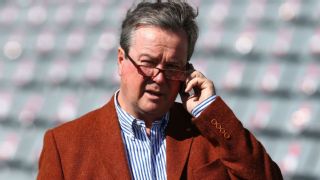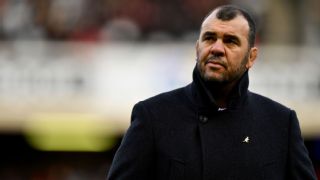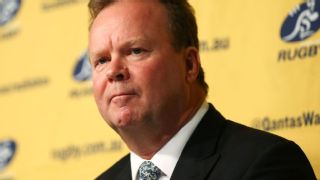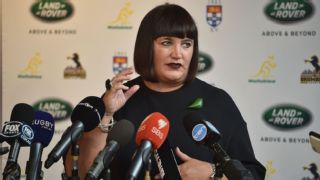|
The most rousing news in Australian rugby is not the revival of the Melbourne Rebels, but that at last senior officials have realised they must again be a political giant. Michael Cheika provided Fairfax Media's Georgina Robinson with the most telling of admissions when the Wallabies coach said that Australia had to be more influential at the international negotiation table. Not that long ago, Australia was a powerful force in world rugby affairs. It boasted delegates in crucial positions. What it said at the then International Rugby Board (now World Rugby) and SANZAAR level mattered, enabling Australia to win important battles over financial issues, law changes, match scheduling, interpretations and regulations. Smart politicking ensured decisions went Australia's way, including guaranteeing the Wallabies a dream schedule at the 2015 Rugby World Cup when they played five straight games at Twickenham.  But that run in London had nothing to do with Bill Pulver, Australian Rugby Union chief executive from 2013-17. It was due to his predecessor being on the ball, and understanding the importance of international rugby politics. During the Pulver era, standards slipped. Important Australian officials missed important meetings. They lacked might, to the extent Australia was often fobbed off at World Rugby and SANZAAR level. The ARU lost control of its destiny, as shown last year when Australia, now the weak partner in the SANZAAR alliance, could not stop the axing of the Western Force. In previous eras, major Australian figures, including national coaches such as Rod Macqueen and Robbie Deans made certain they attended all crucial international meetings. Often next to them was Australian rugby's high performance manager. Last November, the world's leading coaches, referees and officials met in London to discuss laws and trends in the game. Major countries were there. Not Australia. Cheika sent his apologies. It still wasn't a good look, especially as the Australian coaching box, as evidenced by whenever the cameras zoom in on it, hardly agrees with any refereeing decision. No point complaining if you don't turn up.  Cheika is beginning to realise the importance of attending such meetings. 'If we don't start by going to the meetings and doing the stuff, we can't expect to have any influence further up the chain," Cheika told Robinson. "We don't have a lot of people on the [World Rugby] stage in any of those departments, so we're probably not as influential as we should be. We need to grow administrators as well that can be at that level ... You've got to be able to exert influence." Australian rugby has only itself to blame for no longer being influential. It has recently been asleep at the wheel. The Pulver regime loved denigrating their predecessors -- in particular past chief executive John O'Neill. What it is often forgotten is that Cheika, Pulver and co. were given a massive leg up at the 2015 World Cup due to O'Neill's shrewd political skills. Twickenham became Australia's home away from home for all of October, as it was the venue for two pool matches (England and Wales) followed by a quarterfinal (Scotland), semifinal (Argentina) and final (New Zealand). Their Twickenham training sessions had a real down home feel -- with AC/DC's 'Thunderstruck' blasted through the loudspeakers. Australia have credited their better-than-expected World Cup campaign to being settled at the one venue for most of the tournament. When contacted by ESPN this week, O'Neill emphasised how crucial it was for Australia to have an international administerial presence. O'Neill said Australian Rugby Union chairman Dick McGruther had "educated me from day one that it was critical for the Wallabies to be at or about No. 1 or No. 2 in the world, as it gave you genuine clout".  "It is why New Zealand has always been so influential, because there is an absolute cause and effect when you are strutting the world stage as the best team going around. It means your delegates have a much louder voice and can be at the forefront of driving change," O'Neill told ESPN. It works financially, also. O'Neill revealed that he and his New Zealand counterpart, Steve Tew, told World Cup authorities in 2011 "unless we get a fairer slice of the pie in terms of financial compensation we won't be at the 2015 World Cup". "The compensation we were going to be paid was $[Aus]8m. We, with New Zealand and South Africa, stared them down. Guess what? Our compensation or participation fee was increased by $11m to $19m," O'Neill said. Then there is getting your way when important match scheduling is decided. "As I led the campaign to get Bernard Lapasset a second term as IRB chairman, I was then -- and it was a reward -- made chairman of the regulations committee. I was also put on the Rugby World Cup board," O'Neill said. "Being in the inner sanctum you see information and can convert that information where possible to gain some benefit. That's precisely what happened with the Rugby World Cup 2015 draw.  "It soon became clear what Australia's draw would be. Then the Rugby Football Union in essence played into our hands because their original bid said they would spread games all over England. But when they did the numbers, they found the more games they could have at Twickenham, the more money they could make. They owned Twickenham and so Rugby World Cup would have to pay them a hiring fee. "I said: 'Okay you want more games at Twickenham ... I'll give you more games ... Australia can play there." Senior Welsh delegates were pushing for the Australia-Wales pool match to be played in Cardiff. "But I said: 'Hang on, competitive neutrality. The only host of this tournament is England, and the only home ground advantage goes to them.' "They asked, 'Where else should we play the game?' and I said, 'Twickenham'." "Game, set and match. We were already going to play England at Twickenham. And now Wales were playing us there. And, yes, I was well aware of the possibility that if Australia advanced to the finals, they would play five games in a row at Twickenham. "If I hadn't been on the board of Rugby World Cup, [Australia] would have played Wales in Cardiff. So, it isn't an option of simply not showing up, or just showing up to backslap others. You have to be assertive and work from the inside." Raelene Castle and co. will hopefully take note. A major Australian presence on the World Rugby table is crucial if it is not to remain among the also-rans. To exert influence one must be at every meeting -- no matter how mundane.
|
